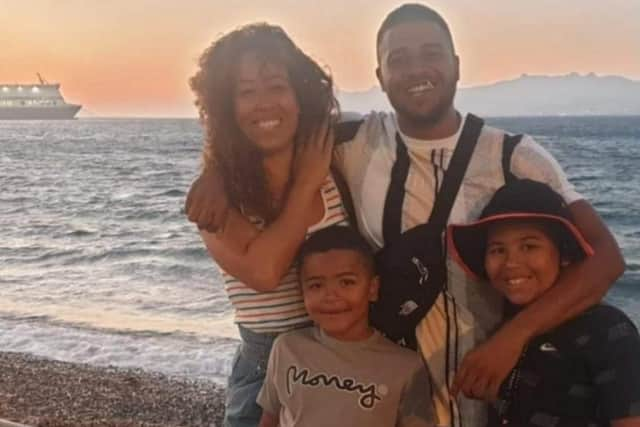Lorette Divers inquest: 'Gross failing' by Sheffield Teaching Hospitals over mum's death after miscarriage
and live on Freeview channel 276
Lorette Divers died at Royal Hallamshire Hospital, which is run by Sheffield Teaching Hospitals Trust, on November 20, 2020, despite extensive efforts to revive her. She was 30.
Her death came two days after she was told her 12-week pregnancy had miscarried in the womb some four weeks earlier – which itself tragically led to her developing an infection in her uterus.


Advertisement
Hide AdAdvertisement
Hide AdHowever, even after she was admitted to hospital on November 20, having suffered from pain, vomiting and high temperatures the night before, she was never assessed by a doctor or had bloods taken during her nine-hour stay.
Further, the inquest heard how staff were ‘distracted’ by her testing positive for Covid-19 as the apparent cause for her high temperature, rather than digging deeper.
At Lorette’s inquest, which opened on Wednesday at Sheffield Coroner’s Court, coroner Tanyka Rawden concluded today (February 25) that there had been a ‘gross failing’ in her death – but couldn’t rule it as negligence.
Ms Rawden said: “There was sufficient concern about her temperatures to cause the midwife to seek a doctor’s review. That review didn’t happen.


Advertisement
Hide AdAdvertisement
Hide Ad"In my view, staff were distracted by how she had Covid-19 and was in pain, giving a reason for the temperature and the vomiting.
"She absolutely should have seen a doctor. She should have had blood samples taken, and they should have been analysed.
"It was a gross failing not to further investigate her temperature by ensuring a doctor’s review was carried out and blood was taken."
However, because any blood samples taken would not have been able to return answers in a short time and therefore may not have been enough to spot the infection and treat it, the coroner could not rule negligence.


Advertisement
Hide AdAdvertisement
Hide AdSpeaking to the family, Ms Rawden said: “Her death was nothing short of a tragedy. In fact, tragedy doesn’t even cover it.
"I have never been so moved as by the family tributes I heard yesterday.”
A post-mortem revealed Lorette was infected with clostridium perfringens, a common bacteria but one that a consultant gynaecologist noted was ‘rare, if not unheard of’ in cases of sepsis in miscarriage without medical intervention such as Lorette’s.
On the afternoon of November 20, she was placed in a room on the gynaecology ward and seen to be ‘comfortable and asking to be left alone to rest’.
Advertisement
Hide AdAdvertisement
Hide AdObservations were made several hours later, but at around 6pm she became unresponsive and the emergency cord was pulled.
Surgeons attempted CPR for over 45 minutes in theatre, but she died at 6.07pm.
She leaves behind her mum Maxine Nicholson, her younger sister, her partner Jahred Smith, and her two sons.
Speaking after the inquest, Maxine said: “Lorette was the most loving and caring mum and daughter anyone could have wished for. We were overjoyed when we found out she was expecting again and it’s almost impossible to comprehend the events that unfolded afterwards.
Advertisement
Hide AdAdvertisement
Hide Ad“While time has moved on since her death it has stood still for our family because of the many concerns we had about what happened to Lorette.
“The inquest, and hearing the circumstances as to why Lorette died, has been incredibly distressing but it was something we needed to do to honour her memory.
“That Lorette is no longer in all of our lives, but particularly her children’s lives, is heartbreaking. How do you tell two young children that their mum has gone and won’t be coming back? The pain of Lorette not being able to see her children growing up or that she won’t get to celebrate milestones in life, such as them passing their exams and getting married, will remain forever.
“We just hope that by speaking out people realise how dangerous sepsis can be. A lot of people have heard of sepsis but it’s vital that people actually know its symptoms and the speed at which it can claim lives.
Advertisement
Hide AdAdvertisement
Hide Ad“All we can wish for now is that Lorette’s death wasn’t in vain and that action is taken to improve patient care. We wouldn’t want others to suffer like our family.”
Lorette’s family were represented by Rosie Charlton, a specialist medical negligence lawyer at Irwin Mitchell.
She said after the inquest: “For more than a year they’ve had a number of concerns about the events that unfolded in the lead up to Lorette’s death.
“Through our work we often see the devastating consequences that families can be left to face because of sepsis. Sadly the inquest heard worrying evidence regarding how Lorette wasn’t classed as an emergency and around the care she received.
Advertisement
Hide AdAdvertisement
Hide Ad“While nothing can make up for the hurt and pain Lorette’s family continue to suffer, it’s vital that lessons are learned to improve patient safety.
“Lorette’s death is a stark reminder of the dangers of sepsis and the need for all medical professionals to be aware of it. Early detection and treatment are key to beating it.”
Dr Jennifer Hill, medical director at Sheffield Teaching Hospitals, said following the hearing: “We cannot imagine the loss Miss Divers’ family and friends are feeling and we would like to wholeheartedly apologise for the aspects of her care which should have been done differently.
“Miss Divers was Covid-19 positive and was sadly suffering a miscarriage when she was admitted as an emergency in November 2020.
Advertisement
Hide AdAdvertisement
Hide Ad“The symptoms of these two conditions are similar to and therefore unfortunately masked the rare and vigorous infection which led to her tragic death in November 2020.
“Regardless of this very unusual situation we fully accept that there were opportunities where we should have done things differently. We never want this to happen again and so have carried out a full review of Miss Divers’ care to ensure we learn and make changes to limit the chances of this situation occurring again.”
Comment Guidelines
National World encourages reader discussion on our stories. User feedback, insights and back-and-forth exchanges add a rich layer of context to reporting. Please review our Community Guidelines before commenting.

